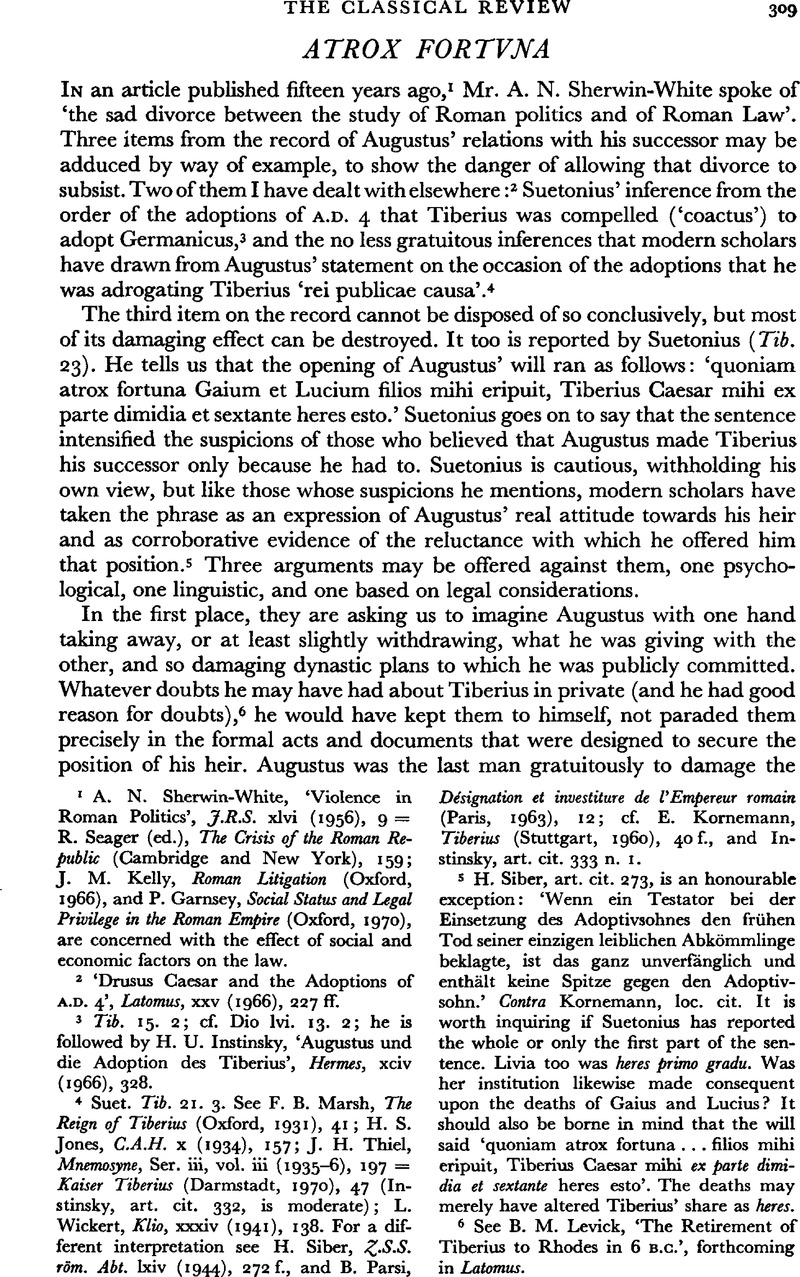Article contents
Atrox Fortvna
Published online by Cambridge University Press: 27 February 2009
Abstract

- Type
- Review Article
- Information
- Copyright
- Copyright © The Classical Association 1972
References
page 309 note 1 Sherwin-White, A. N., ‘Violence in Roman Polities’, J.R.S. xlvi (1956), 9= Seager, R. (ed.), The Crisis of the Roman Republic (Cambridge and New York), 159Google Scholar; Kelly, J. M., Roman Litigation (Oxford, 1966)Google Scholar, and Garnsey, P., Social Status and Legal Privilege in the Roman Empire (Oxford, 1970)Google Scholar, are concerned with the effect of social and economic factors on the law.
page 309 note 2 ‘Drusus Caesar and the Adoptions of A.D. 47’, Latomus, xxv (1966), 227 ff.Google Scholar
page 309 note 3 Tib. 15. 2; cf. Dio lvi. 13. 2; he is followed by Instinsky, H. U., ‘Augustus und sendie Adoption des Tiberius’, Hermes, xciv (1966), 328.Google Scholar
page 309 note 4 Suet. Tib. 21. 3. See Marsh, F. B., The Reign of Tiberius (Oxford, 1931), 41Google Scholar; Jones, H. S., CAM. x (1934), 157Google Scholar; Thiel, J. H., Mnemosyne, Ser. iii, vol. iii (1935–1936)Google Scholar, 197= Kaiser Tiberius (Darmstadt, 1970), 47Google Scholar (Instinsky, art. cit. 332, is moderate); Wickert, L., Klio, xxxiv (1941), 138Google Scholar. For a different interpretation see Siber, H., Z.S.S.röm. Abt. Ixiv (1944), 272 f.Google Scholar, and Parsi, B., Désignation et investiture de l'Empereur romain (Paris, 1963), 12Google Scholar; cf. Kornemann, E., Tiberius (Stuttgart, 1960), 40 f.Google Scholar, and Inpublic stinsky, art. cit. 333 n. 1.
page 309 note 5 H. Siber, art. cit. 273, is an honourable exception: ‘Wenn ein Testator bei der Einsetzung des Adoptivsohnes den frühen Tod seiner einzigen leiblichen Abkommlinge beklagte, ist das ganz unverfanglich und enthält keine Spitze gegen den Adoptivsohn.’ Contra Kornemann, loc. cit. It is worth inquiring if Suetonius has reported the whole or only the first part of the sendietence. Livia too was heres primo gradu. Was her institution likewise made consequent upon the deaths of Gaius and Lucius? It should also be borne in mind that the will said ‘quoniam atrox fortuna … filios mihi eripuit, Tiberius Caesar mihi ex parte dimidia et sextante heres esto’. The deaths may merely have altered Tiberius' share as heres.
page 309 note 6 See B. M. Levick, ‘The Retirement of Tiberius to Rhodes in 6 B.C.’, forthcoming in Latomus.
page 310 note 1 Compare P. Garnsey's account of iniuria atrox, op. cit. 199 f.
page 310 note 2 Schulz, F., Classical Roman Law (Oxford, 1951), 266 ff.Google Scholar, with sources and bibliography.
page 310 note 3 Just. Inst. ii. 13. iff., incorporating Gaius, Inst. ii. 123, cf. 127 f.; 130.
page 311 note 1 Hohl, E., ‘Zu den Testamentum des Augustus’, Klio, xxx (1937), 323 ffGoogle Scholar. For the Proculia–Sabinian dispute over the status of a will if a filius who had been passed over died before the testator see Moyle ad Just. Inst. loc. cit.
page 311 note 2 I hope to deal elsewhere with the consequences of abdicatio; for the adoptatus emancipatus see Gaius, , Inst. ii. 136.Google Scholar
- 4
- Cited by


